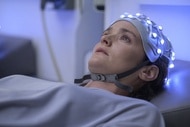Create a free profile to get unlimited access to exclusive videos, sweepstakes, and more!
That marathon Avengers: Endgame viewing may actually have been good for your health, say scientists

Feeling guilty about being an idle, motionless bench warmer for the full two hours and 22 minutes (plus all those previews) of The Rise of Skywalker’s runtime? Well, if you can stay away from the buttered popcorn and the Skittles, your evening-busting evening with even marathon three-hour movies like Avengers: Endgame may actually end up doing your body a small favor, according to a group of British scientists.
To the delight of genre junkies everywhere, a new study of moviegoers in the U.K. reveals that going to the theater and planting yourself in a seat may actually be an experience on par with a light, modest workout. Sure, the research was commissioned by British cinema chain Vue International, so there’s no denying it’s a fortuitous outcome for a company in the business of getting people into theaters. But the methodology, crafted and carried out by the Faculty of Experimental Psychology at University College London, looks legit enough, and we’re definitely stoked about the findings.
According to the report, two groups were asked to carry out two different tasks: one group went to see a screening of last year’s live action adaptation of Disney’s Aladdin; the other read a novel for roughly the same length of time as the movie screening ran. Both groups were hooked up to “biometric sensors to track their heart rate, electrodermal activity and body temperature to measure their physiological responses to the film and novel,” and filled out “pre- and post-performance questionnaires.”
The results yielded some interesting observations, including a “noticeable increase” in the Aladdin viewers’ heart rates, which the scientists likened to the “equivalent [of] a light form of cardio.” For about 40 minutes during the film’s runtime, moviegoers’ heart rates remained in the in the elevated “healthy heart” activity range of 40-80 percent of their maximum heart rates. More intriguing is that the heart-quickening experience was one that was shared across the board.
“When completely invested in the film and its plot twists, participants saw changes in their heart rates and increased emotional arousal levels. Perhaps most fascinatingly, many of these effects were experienced in unison,” the study summary explains, concluding that “a few hours immersed in the big screen provide some much needed relief,” and can “actually boost your creativity, productivity, and connectivity.”
It’s hard to imagine that a lot of the movie viewers didn’t already see Aladdin’s plot twists coming ahead of time, since many were likely familiar with the original 1992 animated film. So we can only guess at what the group’s heart patterns might have looked like if they’d instead been watching all the unforeseen twists and turns of a completely unfamiliar movie.
In any event, we’re content to permanently file these findings away in our memories, so that the next time we emerge bleary-eyed and sedentary after a long three hours in the theater, we can feel great about the experience instead of feeling guilty…so long, that is, as we managed to keep our paws away from the popcorn.


























